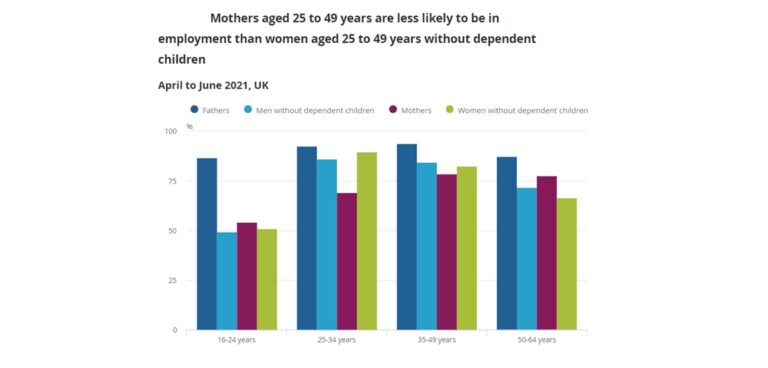The pandemic revolutionised the work landscape, making remote work the new normal for many. However, in a time of economic uncertainty and cooling job markets, employers are tightening their grip on benefits, particularly flexible and hybrid working arrangements. Now, as the world aims to return to pre-pandemic norms, a growing number of employers are compelling their employees to return to the office, leading to reduced flexibility for working parents.According to the most recent data from the UK’s labour market statistics, economic inactivity rates are consistently much higher for women. For example, from March to May 2023, the percentage of women aged 16-64 who were not in work was 24.9%, compared to 16.7% of men. To add to this, the latest data from the Talent Index reveals that a staggering 58% of UK workers have returned to full-time office work, signifying a potential decline in the workplace benefits established during the COVID-19 pandemic. SpareMyTime, a virtual assistant outsourcing company, believes that working parents and mums in particular possess some of the best qualities for dedicated and productive employees. Therefore they have explored this issue using statistics from the ONS to shed light on its implications for working parents and society as a whole.
Gender Disparity in Working Parents
According to data from the Office for National Statistics (ONS), there is a stark difference between employment rates of mothers and fathers, with only 54% of 16 to 24-year-old mothers engaged in work in 2021, compared to 86% of fathers of the same age. As mothers grow older, the employment rates increase, reaching 79% for those aged 35 to 49 years. However, this still falls significantly short of the 94% employment rate observed among same-aged fathers. The rise in employment during these years could be attributed to children entering full-time education, offering parents increased flexibility to pursue careers. However, these findings underline the challenges faced by women in accessing flexible employment opportunities that align with their family responsibilities, emphasising the urgent need to address gender inequality in the workforce.
Comparison of Women Without Dependent Children
A striking contrast emerges when comparing the employment rates of mothers with dependent children to women without such responsibilities. The average employment rate for mothers between the ages of 16 and 49 stands at only 67%, a clear discrepancy compared to the 74% employment rate among women without dependents.
Employment Challenges Faced by Single Parents
The latest ONS data for the UK from July 2023 reveals significant disparities in employment rates among different parenting categories. Among fathers in a couple, an impressive 94% are employed, whereas lone fathers display an employment rate of 82%. However, it’s quite a different story for mothers. Mothers in a couple have a slightly lower employment rate of 79% and only 67% of single mothers are employed, highlighting the unique obstacles they encounter finding work to balance alongside their parental responsibilities.
Post-COVID Changes and Reduced Flexibility
The shift back to in-office work and reduced flexibility following the pandemic may be playing a significant role in the declining employment rates for mothers. Remote work provided many working mothers with increased autonomy in managing work and family responsibilities, allowing them to thrive. However, the return to traditional office environments limits their ability to effectively balance these responsibilities.
Melissa Gauge, Founder of SpareMyTime, expresses why she is concerned by this trend, and why she will continue to prioritise recruiting working parents.
“We love employing parents, especially mums. It blows my mind that so much untapped talent remains excluded from the workforce simply because it requires a touch of creativity to accommodate childcare. Speaking from personal experience, mums possess a wealth of valuable qualities that should never be underestimated: we are masters of multitasking, resilient and adaptable, skilled negotiators, and time management experts. It’s no wonder that many of our clients are successful mothers and entrepreneurs themselves—parenthood is, after all, one of the most fundamental forms of leadership and role modelling.
Over time, we’ve witnessed numerous team members who transitioned from demanding corporate roles, some even holding executive positions, only to find themselves unable to re-enter the workforce after having children. However, through our commitment to fostering flexibility, we have developed a model that not only delights our clients but also offers our team exciting and rewarding career opportunities.
It’s about time that we recognise that motherhood is not a hindrance to professional growth, but rather an asset that brings unique skills and perspectives to the table. By embracing and supporting working parents, we not only tap into a vast pool of talent but promote a more inclusive and diverse work environment.”
SpareMyTime believes that to attract and retain a diverse talent pool, companies must implement policies that support a healthy work-life balance, including flexible work arrangements such as remote work options and flexible hours. Empowering working mothers benefits not only individuals and families but also the economy as a whole. It is crucial to strive for a future where mothers are not forced to choose between their careers and family, but rather can successfully navigate both realms.

